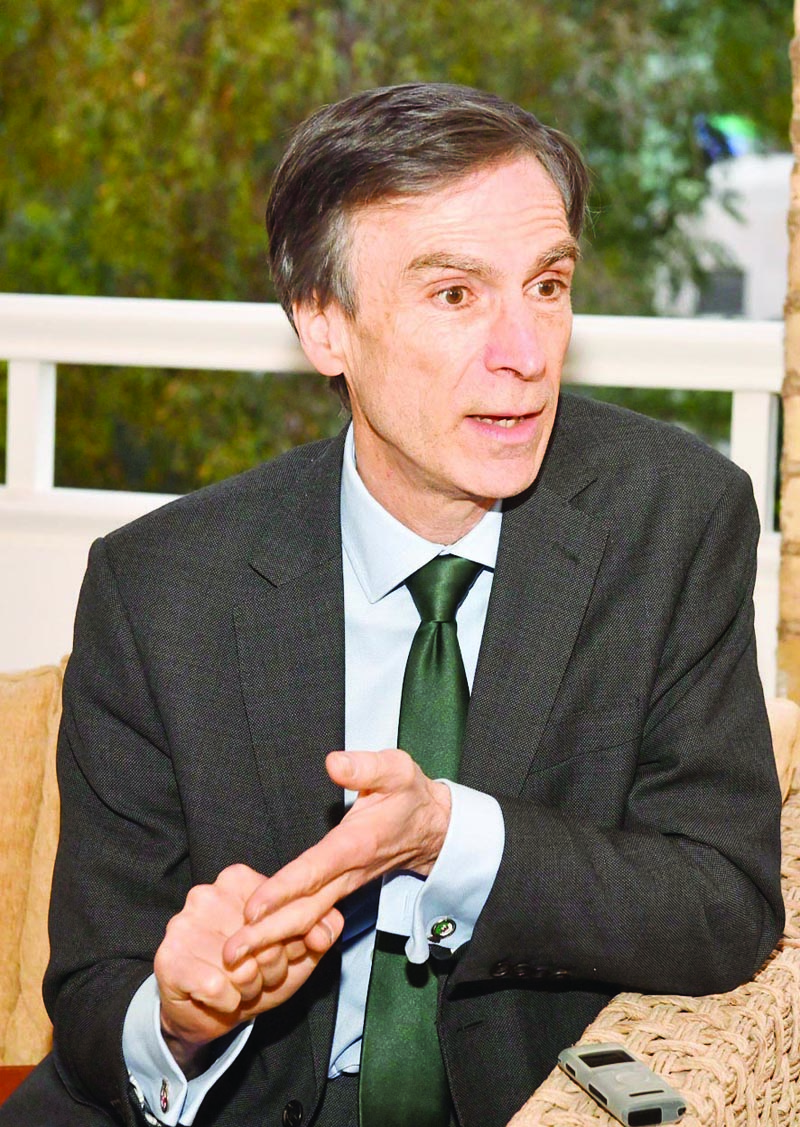
KUWAIT: Britain is seeking even closer relationship with the State of Kuwait following Brexit, a senior government official has said, as London was eyeing broad and deep ties across the region. Minister of State for International Development and the Middle East Dr Andrew Murrison said Britain was seeking advancement of relations with Kuwait since it left the European Union (EU) over the weekend.
"That means seeking broad and deepen all relationships across the region with countries seeking close relationship, and Kuwait is one of those countries," Murrison, the first British Minister to visit Kuwait after Brexit, said in an interview at the British Ambassador's residence. Britain, following Brexit, will be moving at different levels in order to forge new multi-faceted relationships with countries and organizations across the globe, particularly in economy. The British government is "seeking to forge autonomous relationship with other countries that will service the medium and long term" interests, including that of Kuwait, said Murrison.
The British people voted in a referendum in 2016 to leave the EU, and the road the Brexit was marred by complex negotiations between Britain and the EU on one side, and 10 Downing Street with the House of Commons on the others, which resulted in the toppling of two Prime Ministers: David Cameron and Theresa May. But recent parliamentary elections brought about a majority government led by Prime Minister Boris Johnson, which enabled him to finalize the Brexit agreement and leave the EU.
Joint committee
Murrison was in Kuwait on February 2 and co-chaired the Joint Steering Group (JSG) with Deputy Foreign Minister Khaled Al-Jarallah. The two sides expressed commitment to working together over the next six months to advance close Kuwait-Britain relationship. They agreed to continue cooperation on trade, investment, migration, security, defense, cyber security, healthcare, education, higher education, scientific research, environment, culture and international development.
The two parties discussed how to combat shared threats, including protection of aviation interests through improved airport security and training. The two sides signed an MoU between Kuwait Fund for Arab Economic Development (KFAED) and Britain's Department for International Development to establish a framework for operational cooperation to ultimately contribute to realization of UN Sustainable Development Goals (SDGs), and strengthen development global efforts.
The two countries also signed an MoU between Kuwait Society of Engineers (KSE) and the UK Engineering Council EngC, which will provide Membership to British Chartered and Incorporated Engineers according to KSE requirements and the criteria needed to become members of KSE. EngC shall do the same according to EngC requirements and criteria needed for that. The JSG tries to "extend the range of things we partner on and do together .. to establish what we are going to do along a number of fronts" with Kuwait, said Murrison.
On the Middle East peace process, Murrison called on the Israelis and Palestinians to get back to the negotiations' table "and talk about what the future might look like, and try to find something mutually acceptable to both." He warned against closing down discussions between parties concerned because it would only mean prolonged suffering of Palestinian people who share "a very tight constraint space in this region.
They are the ones who suffer both in security terms and in terms of well-being and livelihood." Murrison acknowledged that the Palestinian people were living in impoverished, constrained and restricted lives right now, and they must expect a better tomorrow. He said there were little prospects of things getting better in Gaza Strip and the West Bank. The senior official noted that Britain was putting a great deal of financial assistance into humanitarian assistance, education and health care in Gaza and the West Bank.
Maritime navigation
Murrison, on safety of maritime navigation on Strait of Hormuz, called for ensuring safety of the strategic waterway, through which a huge proportion of the globe's oil and gas move. "It is a vital checkpoint on which Gulf economies [and] our economies rely. It is a general principle that we should have freedom of navigation," he said, citing Britain's full engagement in guaranteeing safety of navigation in the Strait.
Murrison, on the other hand, said Britain was engaged with France and Germany, known as European three (E3), to bring about Iran's full compliance with the nuclear agreement. He meanwhile said it was very important that coalition maintained its outputs in Iraq and elsewhere in the region in order to prevent re-emergence of the so-called Islamic State (IS). On Libya, Murrison urged the Libyan parties to comply with outcome of recently-held conference in Berlin, Germany, in order to pave way for a political process in compliance with relevant UN Security Council resolutions. - KUNA











